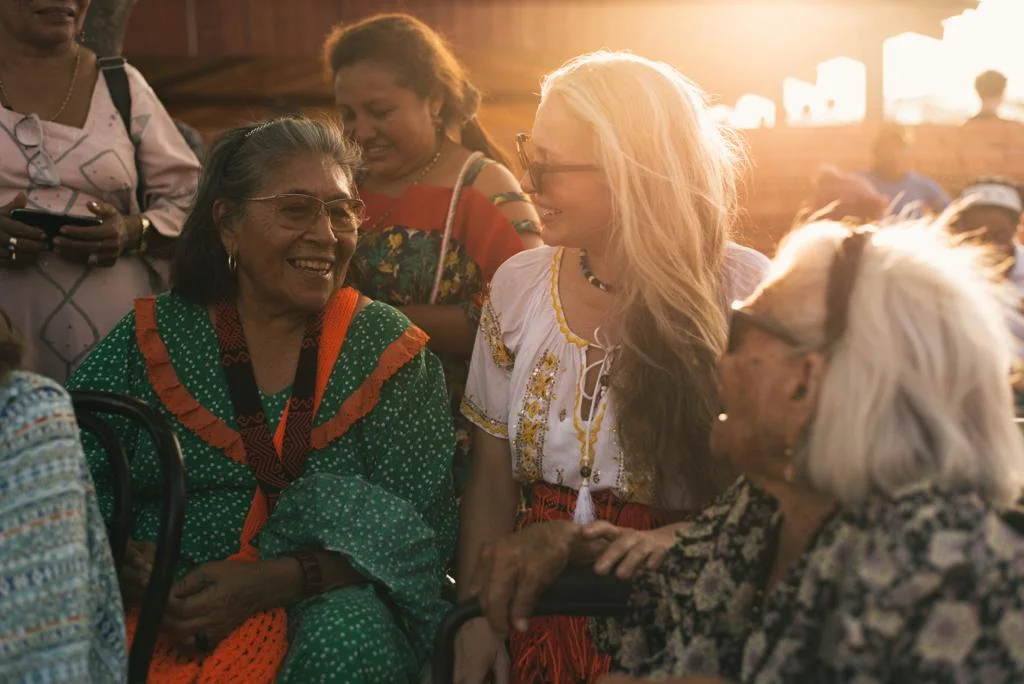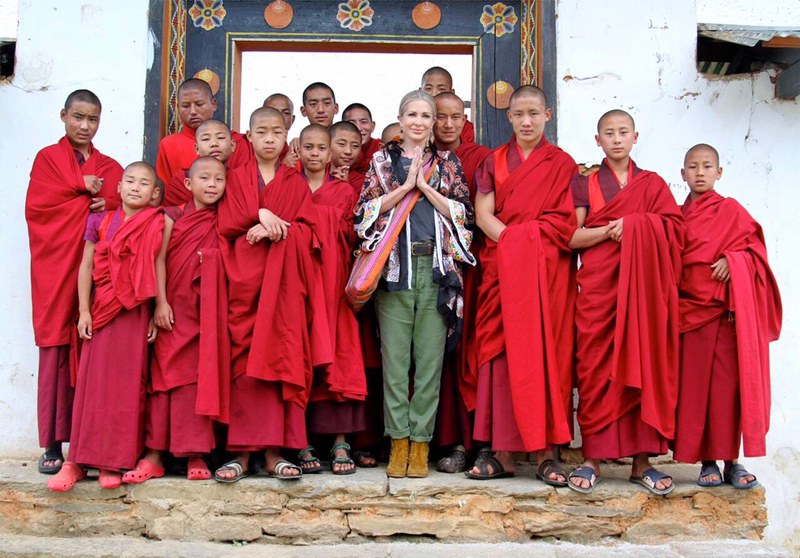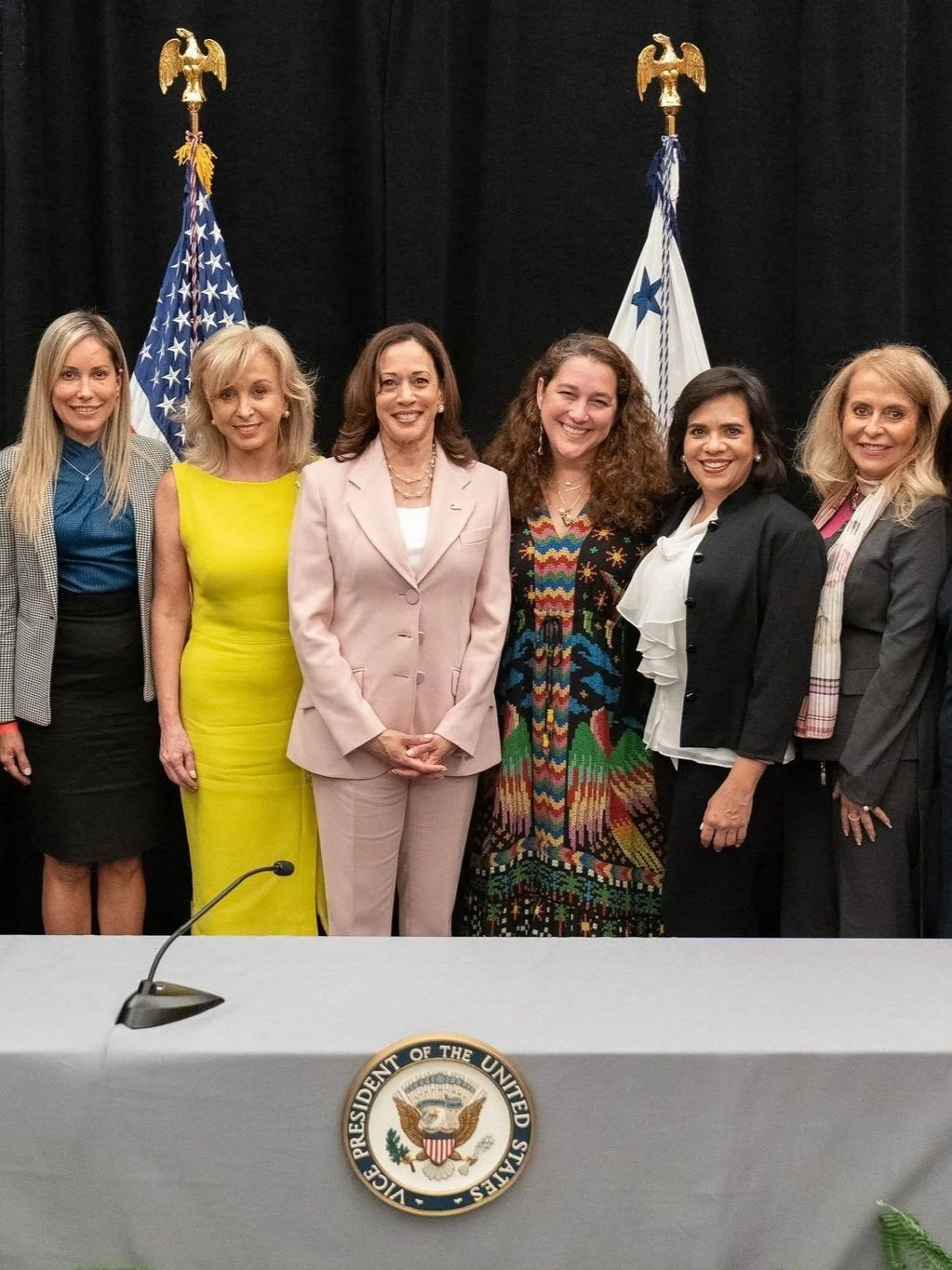On the tail end of my recent trip to Colombia, I reflected on my path thus far, and on the importance of coalitions. Since my university years, my motivation has always been to create coalitions, to be inclusive of all cultures, races, religions, nationalities and careers. I grew up in different countries, and my parents often traveled the world with us. My mother was an anthropologist and a sociologist, and she wanted us kids to think globally. As such, these trips were not the lavish jet-set vacations one might imagine, but educational, disciplinary ones that gave us great awareness about our world.
My parents, who were self-made, also taught us to be holistic in all things. They both always meditated and followed George Gurdjieff’s methods of disciplining the body, mind and emotions to be better balanced, communicate better, and access the “real you” energy that is always inside.
Bringing different groups together was always my forte. I never really belonged to any one group of friends, instead I always merged and mixed with everyone. Even when sometimes some of those friends didn’t like each other, to their surprise, they would often end up together in one room in my vacation home, unexpectedly getting over their differences.
Much in this vein, I ended up doing business that merged renowned international designers since I was 22 (1989 until 2002). They included Chanel, Chloé, Givenchy, Mugler and Montana and many others, with new talents at the time such as Alexander McQueen, John Galliano, Dolce & Gabbana, Alberta Ferretti, Moschino, the late Azzedine Alaïa, Herve Leger and Karl Lagerfeld, along with Venezuelan and Colombian designers.
An early Alexander McQueen collection.
Then, as of 1995, I began to apply the principles and values of a coalition with start-ups. My family and I loved organizing wellbeing-themed vacations with different groups. I also worked on myself by doing and getting meditation groups together with Deepak Chopra at his center with less-known but nonetheless very interesting spiritual people. My family and I were partners and shareholders in his first center and website “My Potential” with his daughter Mallika Chopra, who today is a writer. The Deepak Chopra Center has been majority acquired by Matt Harris and his wife Jennifer Harris - good friends of mine - along with the Chopra family.
I am on the board of six different international non-profits, and together with my partners and founders, we own a portfolio of more than 30 companies including funds that today impact more than 30,000 professional lives directly and indirectly. I lost exact count, but what makes me feel complete is the knowledge that we are all affecting lives globally and empowering global founders, and also communities and countries, working with governments with our coalitions, and being inclusive of all cultures.
A coalition of like-minded women in San Jose, Costa Rica: with Livia Firth, founder of Eco-Age, Marianne Hernandez, president of PACUNAM, and Celina de Sola, co-founder and vice president of Glasswing.
Creating global coalitions, giving and paying forward, and supporting great entrepreneurs with strong personalities, groups, companies and good governments has been a natural way of life for me.
Being behind-the-scenes was a comfortable place for me, but also an impossible task when you are in the fashion industry. Sooner or later you need to get out of that behind-the-scenes comfort zone, especially if it has to do with the internet or a company with the success of Net-a-Porter, which I backed without fear with more money and time than I should have, 75% of my capital, all cash. I recall this because it is not a typical way of investing. This bold way of living in a state of risk and fearlessness has always motivated me to help and support innovators. I invest as a disruptor as I believe we need to give new entrepreneurs opportunities to change the world, as good ideas never die.
I then soon found out that people would not hesitate to take credit for things other people or I did in business, things I know they did not do. I had seen this in my companies among senior and junior employees. I did not care so much about taking credit for things in my business or personal life, but when it came to charity work, I began to care. Since I was at the University of Miami, I have been in charge of philanthropic pursuits within my sorority, and sometimes saw that people like to take credit for anonymous donations that I knew they didn’t make.
Because you need to see who is honestly good and who is not, and who is genuine and who is not, as in business, we talk about money, but in charities, we talk about people’s lives. And so, I then saw a reason to use Instagram and tell my story and truths. I started my Instagram as a private account as my friends Diana D’Hendecourt, Clarissa Bronfman, and Marianne Hernandez (once my partners in an online psychological women’s community and magazine that lasted from 1998 until 2002, which failed, but a great experience for us) wanted me to get out of my comfort zone and were tired of not being able to know what I was doing for others, especially as we all have helped each other. Diana helped me with CoutureLab and Dr Jackson’s, and helped me to discover I was dyslexic, I help Marianne with Pacunam, and I am on her board, Marianne helps Clarissa with MOMA and is on the board, I help Clarissa with her jewlery line, and Clarissa helps me with Figue.
CoutureLab was both a physical store in London’s Belgravia, as well as a platform that supported emerging designers, artisans and global craftsmanship.
My team then helped me create my website (including Mauro Durant my partner in Dr Jackson’s who decided to launch it without me knowing), along with Anabel Maldonado, my editor, Julie Hurst, our writer, and Thomas Lillo, my right-hand man. We are now running it privately, but it will soon be more open, telling my more personal story, how it started with my spiritual path and connections to nature, my love of meditation, Qigong and trekking, and my work in Bhutan. It will also be a place where I can share more about my work as a WWF council member, thanks to the amazing mentorship of Michael Philipp and Timothy Sharpe, who got me involved and convinced me that this was going to be an important organization for me to get involved in and become passionate about.
My work with Bhutan included group trips that had me bringing people from all over, including my Qigong teacher David Melladew, and then helping Bhutan Nuns Foundation, with the Queen Mother of Bhutan, and Tashi Zangmo the CEO of the Nuns Foundation, getting involved in the Bhutan For Life conservation project with the young Queen Jetsun Pema, donating to the Bhutan for Life conservation project, and donating to monasteries who prayed for my country, Venezuela. They are all personal friends and my extended family in Bhutan.
In Bhutan with a group of young monks.
This last trip to Colombia has been the hardest, but most rewarding trip ever for me. It has been so difficult in every way – few people realize how impoverished much of our countries still are and how little infrastructure we have. When I got to the house in the middle of the jungle in La Guajira and experienced having water and soap on my skin again, I thought, ‘luxury is simply a bed and a shower’. Others who were not used to this level of poverty common in Latin America were shocked to see the conditions some were living in, people who are poor but love nature so much that they feel blessed.
In La Guajira, Colombia with Paula Mendoza and Donna Karan as part of Looking For The Masters.
Yes, we all know about the luxury camping and glam safari options in Africa, the luxury jungle retreats in Bali, and many sophisticated remote places in India, Brazil, Argentina and Mexico. But the rest of Latin America, with the exception of Costa Rica, is not like that.
What is ironic is that these remote places with hardship and low living standards are where the best artisans are found. But unlike many remote places where a few hours away you can find a hotel and enjoy the luxury of a fresh shower, in Colombia, Venezuela, El Salvador and Guatemala, you simply don’t have this. I have found creative ways in how to help artisans sell globally with the help of non-profit private companies such as Rebecca van Bergen’s Nest and the government, but I think we now need to take it all to the next level. We all need to be inclusive more than ever, we need to give our least privileged artisans an opportunity to make money for themselves and stop big companies from taking advantage of their talents. I have committed to raising their prices and improving their quality of life with my global network of designers through limited editions, as some artisan creations take 3-6 months, and up to year to make by hand.
Connecting with artisan communities in La Guajira, Colombia.
For the next 20 years, we are all colliding on a mission to raise the standards of living in all these countries and hopefully people won’t allow what happened in Venezuela to ever happen again. I have a path, my coalition and my partners in the journey. Create a path for yourself and help where you are, or if you cannot help your country then help the neighbours who help the immigrants from your country. I felt that mission was important ever since I departed Venezuela.
Since I left my country, I always had a void that I never felt before and made me understand the void that my Cuban family felt as US citizens. To be able to return to the place you are born is a luxury we all should have. I never really thought about this until the day I left Venezuela in 2002, and now, I don’t have this luxury. And I never thought Latin America was going to call me back with a greater sense of duty. Yet today, I am an active member on the board of different organizations that focus on development in Latin America such as Glasswing and Pacunam.
Paula and Alejandro Calderon's Looking For The Masters, the Herencia Colombia initiative with the Vice President of Colombia Marta Lucia Ramirez, and Cecilia Duque who has dedicated all her life to artisans in Colombia and written two books on the topic, and my childhood friend Gabriela Febres Cordero who is Venezuelan, but was married to the Ambassador of Colombia in Washington for 12 years, all gave me another reason to exist and brought more meaning to my mission. It all aligns with the same mission and commitment I have forged in Bhutan.
Colombia has given me some kind of closure to my void, and the feeling that I am back home as Venezuela and Colombia were sisters countries in what was previously known as one land - “Gran Colombia”. Funnily enough, they are both matriarchal societies, and Colombia is a place where I feel close to home as I met so many Venezuelans there.
I also never thought that Bhutan and Africa would be part of my path, but it makes sense as India was part of my parents’ path for years. My late godfather, my mother’s brother, fought in Congo for freedom and was always helping Haiti, so I am sure my relationships and love and respect for Donna Karan’s work in Haiti with Urban Zen is not a coincidence. Nor the work I am doing with Livia Firth and EcoAge. Through coalitions, karmically things are coming back to me in a weird way.
Mentoring girls at a Glasswing school in Guatemala, Central America.
As someone who never wanted children, I always feel the need to mother the world - a dangerous need - and today I have protectors around me, people who stop me from going all over the place, allow me to focus my energy and stay in one direction, and say no to the people who are not on my path. More and more now, I feel centered, and am able to say no to the people who are not on my journey, as I feel my path is already set.
A happy memory with my mother and late father.
I am half-deaf, struggle with sounds, am dyslexic and am the only Latin woman investing her own money in fashion within the technology and finance space dominated by men. My path has never been normal, my enemies have not been small, but my friends have been my biggest asset. In many ways, my path and childhood was a bit weird, and I owe having this big network to being inclusive of all minorities and people to my upbringing, and my parents’ weird, globally-minded intellectualism. It’s a blessing to have this incredible network, and the best friends in the world, as they are more powerful than my enemies. Together, all minorities and “weird” people: we are the majority, and we are becoming the norm today.
I toast all of those who are brave enough to believe in themselves, and pledge to help the ones who are less lucky.




















